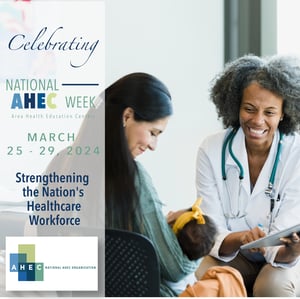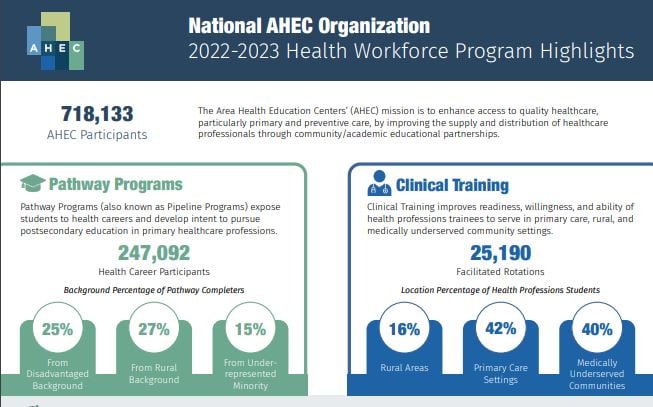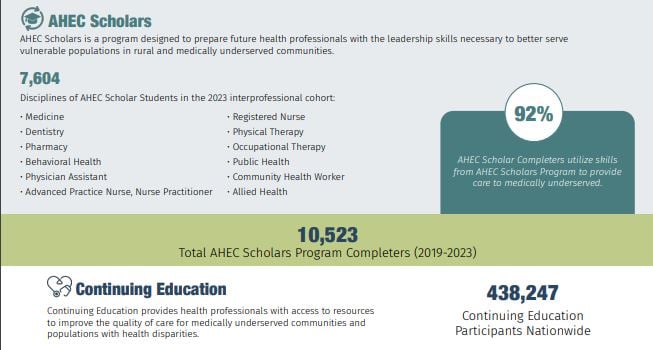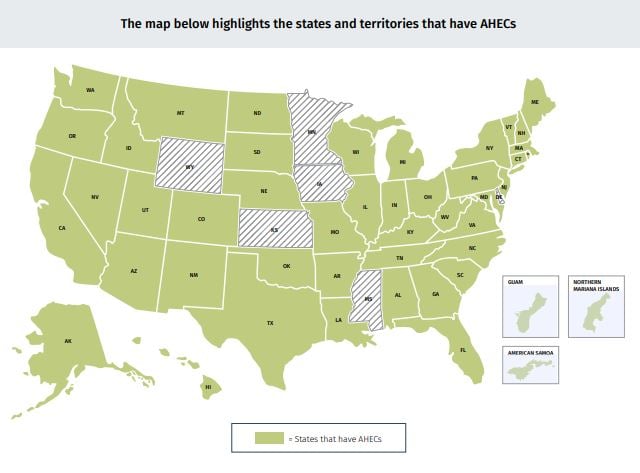The nation’s Area Health Education Centers (AHECs) will celebrate National AHEC Week March 25-29. During the week, the National AHEC Organization will highlight AHECs’ work strengthening the healthcare workforce and improving access to quality healthcare.
 AHECs achieve this mission by recruiting and training students from diverse populations and paving the way for them to continue their health profession careers in underserved communities.Hannah Warren, a native Alaskan, grew up thinking she had to suppress her heritage and sacrifice part of herself to succeed in the Western world. However, joining AHEC Scholars changed her point of view. “
AHECs achieve this mission by recruiting and training students from diverse populations and paving the way for them to continue their health profession careers in underserved communities.Hannah Warren, a native Alaskan, grew up thinking she had to suppress her heritage and sacrifice part of herself to succeed in the Western world. However, joining AHEC Scholars changed her point of view. “
Being a part of an organization that encourages me to go out and serve rural areas while being up to date on studies regarding Alaskan native people is so empowering,” Warren said. “It’s powerful knowing that I don’t have to sacrifice a part of who I am to continue with my professional career.” Learn more about Hannah’s story here.
AHECs also partner with clinicians like Dr. Laura Geyer who strive to improve health equity in underserved communities. In collaboration with the Suwannee River AHEC and Gulfcoast South AHEC, both located in Florida, Dr. Guyer helped create a health literacy curriculum for the Florida AHECs and also offered additional training through the statewide Florida Rural Health Association.
Dr. Guyer believes the AHEC approach is not only necessary but effective. “As our nation’s diversity seeks solutions for unity, AHEC offers many of the programs needed to build the capacity of the workforce and maintain it.”
In 2023, 718,133 people participated in AHEC programs. Read more in the 2022-2023 AHEC end-of-year report.
Dr. Julie Bazan, president of the National AHEC Organization and director of Mid Rio Grande Border AHEC, describes the AHEC program impact: “Communities become better informed, better prepared, and more aware of the numerous opportunities available to improve healthcare. In one word, AHEC is powerful."
Congress established the AHEC program in 1971 to strengthen and diversify the healthcare workforce in rural and medically underserved communities. Today, 300 AHECs in the United States serve 44 states and six U.S. territories.
To learn more about the impact of AHEC programming, visit the National AHEC Organization (NAO) website.
History
The Area Health Education Centers (AHEC) program was developed by Congress in 1971 to
recruit, train and retain a health professions workforce committed to underserved populations.
The AHEC program helps bring the resources of academic health professions training programs
to address local community health needs. The strength of the AHEC Network is its ability to
creatively adapt national initiatives to help address local and regional health care issues.
The purpose of the AHEC program is to meet the needs of the communities they serve through
robust community-academic partnerships, with a focus on exposure, education, and training of
the current and future health care workforce.
AHEC offices are embedded in the communities they serve, positioning them to respond rapidly
to emergent training needs of health professionals, health professions students, and
interprofessional teams on issues associated with healthcare service needs and changing
developments, including natural disasters, emerging health issues (e.g., coronavirus pandemic),
and substance use disorders.
Currently, 46 AHEC programs with more than 261 centers operate in almost every state
and the District of Columbia. Approximately 120 medical schools and 600 nursing and allied
health schools work collaboratively with AHECs to improve health for underserved and underrepresented populations. The national AHEC network consists of more than 300 AHEC program
offices and centers, serving more than 85% of the counties in the United States, with almost 50
years of experience.








